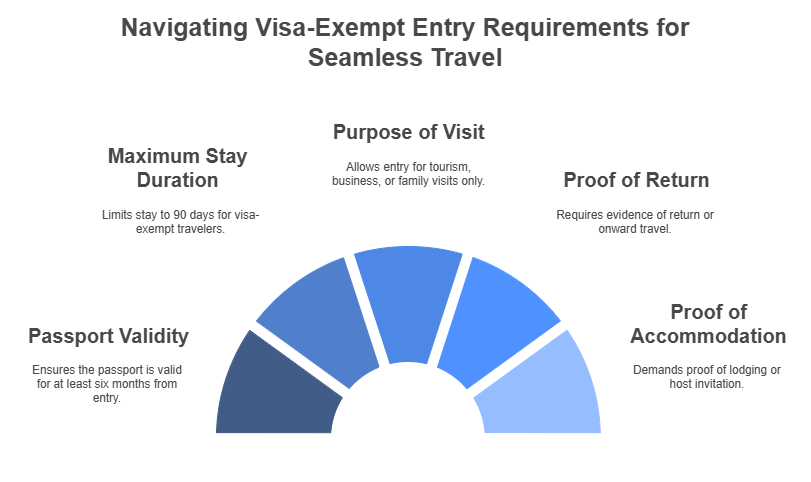
With its landscapes of enchantment, vibrant markets, and rich cultural heritage, Morocco is a country that welcomes millions of visitors every year. While most travelers need visas to enter, some countries are exempt and can visit Morocco for a limited period without a visa. Knowing the rules of exemption will help in smooth travel planning.
Morocco's visa-free policy lets citizens of many countries enter the country without applying for a Morocco visa, hence making it easy and straightforward for them to travel for short stays. It is a step towards boosting tourism and improving international relationships taken by Morocco. Eligible travelers can see Morocco's vibrant cities, cultural heritage, and stunning landscapes with just a valid passport. Though the visa-free entry is convenient, visitors are still expected to follow some entry rules regarding things like passport validity of at least six months and understanding the maximum stay duration for a person of their nationality. This kind of visa exemption entitles these tourists, businessmen, or visitors to family and friends to a stay not exceeding 90 days.
The following is the list for countries whose nationals are visa-exempt to enter Morocco. Nationals of the following countries do not need a visa to enter Morocco for tourism and business purposes:
European Union: All EU member states.
Other Countries: Andorra, Argentina, Australia, Azerbaijan, Bahrain, Brazil, Burkina Faso, Canada, Cape Verde, Chile, China, Colombia, Dominican Republic, Gabon, Hong Kong, Iceland, Indonesia, Japan, Kuwait, Liechtenstein, Macao, Malaysia, Maldives, Mexico, Monaco, New Zealand, Niger, Norway, Oman, Peru, Philippines, Qatar, Russia, San Marino, Saudi Arabia, Senegal, Singapore, South Korea, Switzerland, Togo, Tunisia, Turkey, United Arab Emirates, United Kingdom, United States.

Even though visa exemption lets travelers enter Morocco without prior authorization, there are some conditions to fulfill:
Dual nationals who intend to travel to Morocco with an exempt passport, as well as a non-exempt passport, are advised to use the exempt passport for ease of entry. It is always best to ensure the passport you present meets the entry requirements of Morocco for admission.
The following shall be presented by visa-exempt arrivals upon arrival:
Border officials may ask questions about your visit. Answer honestly and provide the requested documentation to ensure smooth entry.
The length of time a visa-free stay is allowed in Morocco depends on nationality. Most of the visitors who qualify for visa-free entry can stay in Morocco for a period of 90 days. Normally, this is a tourist or short-visit stay that is granted and will not permit employment or resident status. Travelers must leave before the expiration of the period to avoid being fined or having future travel issues. The period is also advised to be checked before traveling for one's nationality, since it may be different. If a longer period is needed, an application for an appropriate visa should be made.
If you'd like to stay longer than the 90-day maximum, you'll have to apply for an extension at a Moroccan police station. To request an extension:
This is subject to the discretion of the immigration, so it is best to begin well prior to the expiration date of your original visa-free period.
Overstaying your allowed duration as a visa-free visitor in Morocco can lead to serious consequences. You may be fined for each day of overstay, which must be paid before you are allowed to leave the country. In some cases, overstayers may face deportation or be banned from re-entering Morocco in the future. Additionally, overstaying could complicate future visa applications, both for Morocco and other countries. To avoid these issues, ensure you leave Morocco before your visa-free period expires or apply for an extension through local authorities if necessary.
If your country is not visa-exempt, you will have to apply for either:
Here’s an outline about the differences between visa-free entry and eVisa requirements:
|
Criteria |
Visa-Free Entry |
eVisa Requirements |
|
Eligibility |
Available to citizens of specific countries with agreements. |
Available to travelers from countries that require pre-approval. |
|
Application Process |
No application required; entry is granted upon arrival. |
Online application required with document submission and fee payment. |
|
Duration of Stay |
Typically up to 90 days (varies by nationality). |
Typically up to 30 days with possible extension. |
|
Documentation |
Passport, proof of sufficient funds/accommodation. |
Passport copy, travel itinerary, photograph, and additional documents. |
|
Ease of Entry |
Direct entry at the border with passport. |
Must present printed eVisa approval at border control. |
No, tourists traveling based on visa-free entry cannot work or study in Morocco during their stay. Visa-free entry is strictly for tourism or short-term visits, and it is not allowed for working or enrolling in any educational program on such a visa class. Those planning to work or study in Morocco will have to apply for a work visa or student visa through proper channels before embarking on the trip. Failure to comply with these might result in fines, deportation, or future problems traveling to Morocco. Ensure that you have the proper visa which will cover the activities you will be doing within the country.
The following are some tips to help you make the most of your visa-free visit to Morocco:
Travelers from visa-exempt countries enjoy several advantages:
Following are some of the common misunderstandings related to Morocco's visa-free policy:
How many days can I stay in Morocco without a visa?
The Visa-free stays mostly go up to 90 days, but most depend on nationality. Always find out the exact time permitted for your specific country.
Can I work or study in Morocco visa-free?
No, visa-free entry allows a visit to Morocco for tourism or business only. In such a case, you shall apply for either a work visa or a student visa if you want to do those activities.
Do I need travel insurance for Morocco as a visa-free national?
Travel insurance is, though not always required, still highly recommended, as it comes in handy for your own safety and puts your mind at rest during your stay in Morocco.
Can I extend my stay in Morocco if I'm visa-exempt?
Generally, visa exemptions do not allow for extensions. You may need to apply for a residence or long-term visa if you intend to stay longer.
What documents do I need when traveling visa-free to Morocco?
Have in your possession a valid passport, return flight ticket, proof of sufficient funds, and any other documents requested by the authorities upon arrival.
Content Disclaimer: While this information was last updated in January 2025, we strongly suggest confirming all travel details with the appropriate governmental agencies, embassies, and airlines.
1
Step1: Complete the online application by entering your passport details.
Step2: Make the payment online using a credit card.
Step3: Check your email for the payment confirmation and receive your e-visa.
Bonjour, Un Algérien titulaire d'un passeport algérien a-t-il besoin d'un visa pour entrer au Maroc ? Merci beaucoup pour votre réponse rapide. Cordialement, Sofiane